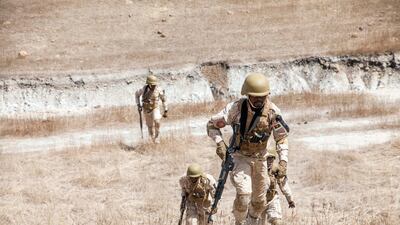The answer to Africa’s future security may lie in a battle waged 124 years ago.
In that decisive encounter, an emperor not only repelled a colonial force but united, inspired, trained and led his people into battle, ultimately ensuring that they would be the only country on the entire continent to resist conquest by the West.
The battle, in March 1896, is known as Adwa. The emperor was Ethiopia’s Menelik II, whose forces expelled Italian colonisers. A diverse cadre of local tribes and regional leaders pulled together to make it happen. I recently recalled the Battle of Adwa when I heard Vera Songwe, head of the UN Economic Commission on Africa, ask US Secretary of State Mike Pompeo in Addis Ababa: “Should Africa have its own West Point?”

There are countless reasons why an elite African military academy could go wrong. Africa encompasses 54 countries, and a singular military-industrial complex for the continent would be an immense challenge. There are a number of questions to be considered. Who would fund it? What of the tribal loyalties and different colonial legacies? Upon whose military traditions would it be built? What of the dangers of larger nations asserting hegemonic dominance over smaller ones? Could militaries – traditionally institutions of the nation state – be built around the needs of a continent? And what about the existing training programmes Western nations conduct in Africa?

These are all legitimate concerns. What if we looked for the opportunity in these putative obstacles? First, it is time that the continent stood up with one voice, removed from the threat of aid money being withdrawn or the US presence being removed if they did not comply. The West has built much of Africa and their colonies in its image. Militaries within the continent are a product of the old colonial game plan to divide and rule. They have been built and trained to fight the enemy outside, not the enemy within. That is to say, present African militaries have been designed to fight wars with neighbouring countries and their citizens and not focus on peace enforcement between their own conflicting tribes. Nor have they been trained to battle home-grown extremists, terror cells, or breakaway movements. There are 21 cases today of armed national conflict in Africa, such as South Sudan and the Democratic Republic of Congo.
Kenya’s “donkey war" with Al Shabab underscores this point. The Kenyan army has been picked off by the group as it moves heavy equipment and conducts its logistics in mud, while lighter and nimbler insurgent groups who know the terrain use different, more effective techniques.
An African West Point can build a new, universal post-colonial framework. Such an institution could be a moment of reckoning built on the principles of diversity and unity the Battle of Adwa demonstrated.
Second, Africa’s version of West Point will not be a national war college. Coursework could be designed such that understanding different military doctrines, identifying best practices, overcoming language barriers and communications are addressed. Graduating officers would develop cohesion and fluency in building relationships and communicating to the international community.
Judd Devermont, head of the Africa Programme for the Centre for Strategic and International Studies says, “a West Point could deepen co-operation and foster a shared ethos for the continent's security leaders. It could complement national schools and bilateral training programmes.”
Young officers would be trained in the common destiny of the African continent and develop inter-operability and common military ethos with a focus on security issues that unite rather than divide. Programming could create a new African-centric heritage that is neither European nor American and is not driven by the needs of the West.
As the US contemplates a military pull-out in the Sahel region, where Al Qaeda and ISIS are gaining ground, and Western and African forces confront Al Shabab in East Africa, a West Point would further the development of an internal security strategy. Candyce Kelshall, head of the Canadian Association for Security and Intelligence Studies, says, “An African West point would enable the rise of a new form of leadership that comes from within the borders of the continent and is squarely continent-focused. Its ethos must be peace enforcement.”
Africa’s West Point could be based in South Africa, Kenya, Benin or Rwanda – all of which are nations with strong, modern infrastructure. There could also be multiple campuses across the continent.
Today, internal African conflicts are increasing and democratic elections are under threat. A military industrial complex could drive technological innovation in aerospace engineering, cutting-edge usage of data for defence and even new medical advancements. A stronger continental military would protect vulnerable groups and create the stability required for talented pools of young Africans to truly thrive and drive transformation.
In drawing from the past, Africa can build its future.
Zain Verjee is a former CNN correspondent and founder and CEO of the Zain Verjee Group


